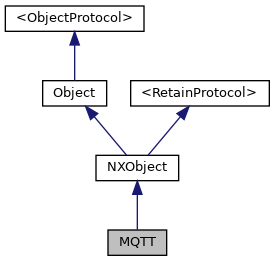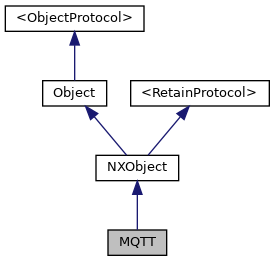#import <Network/Network.h>


Instance Methods | |
| (id< MQTTDelegate >) | - delegate |
| Gets the current MQTT delegate. More... | |
| (void) | - setDelegate: |
| Sets the MQTT delegate. More... | |
| (BOOL) | - connect |
| Begin an asynchronous connection to the configured MQTT broker. More... | |
| (BOOL) | - connectWithUser:password: |
| Begin an asynchronous connection with credentials. More... | |
| (BOOL) | - disconnect |
| Begin an asynchronous disconnect from the broker. More... | |
| (BOOL) | - publishString:toTopic:qos:retain: |
| Publish a string payload to a topic. More... | |
| (BOOL) | - publishData:toTopic:qos:retain: |
| Publish binary data to a topic. More... | |
| (BOOL) | - publishJSON:toTopic:qos:retain: |
| Publish a JSON-encoded object to a topic. More... | |
 Instance Methods inherited from NXObject Instance Methods inherited from NXObject | |
| (id) | - retain |
| Increases the retain count of the receiver. More... | |
| (void) | - release |
| Decreases the retain count of the receiver. More... | |
| (id) | - autorelease |
| Adds the receiver to the autorelease pool. | |
 Instance Methods inherited from Object Instance Methods inherited from Object | |
| (void) | - dealloc |
| Free resources for an existing instance. | |
| (id) | - init |
| Initialize the instance, after allocation. More... | |
| (Class) | - class |
| Returns the class of the instance. More... | |
| (Class) | - superclass |
| Returns the superclass of the instance. More... | |
| (BOOL) | - isEqual: |
| Compares the receiver to another object for equality. More... | |
| (BOOL) | - isKindOfClass: |
| Returns a Boolean value that indicates whether the receiver is an instance of a given class. More... | |
| (BOOL) | - conformsTo: |
| Checks if the receiver's class conforms to a protocol. More... | |
| (NXString *) | - description |
| Returns a string that represents the instance. More... | |
 Instance Methods inherited from <ObjectProtocol> Instance Methods inherited from <ObjectProtocol> | |
| (BOOL) | - respondsToSelector: |
| Checks if the receiver responds to a selector. More... | |
Class Methods | |
| (MQTT *) | + clientWithHost: |
| Creates a new MQTT client. More... | |
| (MQTT *) | + clientWithHost:port:clientIdentifier:timeout: |
| Creates a new MQTT client. More... | |
 Class Methods inherited from NXObject Class Methods inherited from NXObject | |
| (id) | + allocWithZone: |
| Allocates a new instance of an object in a specific memory zone. More... | |
 Class Methods inherited from Object Class Methods inherited from Object | |
| (void) | + initialize |
| Performs one-time initialization for the class. More... | |
| (id) | + alloc |
| Allocate a new class instance. More... | |
| (Class) | + class |
| Returns the class object. More... | |
| (Class) | + superclass |
| Returns the superclass of the class. More... | |
| (const char *) | + name |
| Returns the name of the class. More... | |
| (BOOL) | + conformsTo: |
| Checks if the class conforms to a protocol. More... | |
| (NXString *) | + description |
| Returns a string that represents the class. More... | |
Additional Inherited Members | |
 Protected Attributes inherited from NXObject Protected Attributes inherited from NXObject | |
| id | _zone |
| The memory zone where the object is allocated. | |
| unsigned short | _retain |
| The retain count of the object. | |
| id | _next |
| The next object in an autorelease pool. | |
 Protected Attributes inherited from Object Protected Attributes inherited from Object | |
| Class | isa |
| A pointer to the object's class structure. More... | |
Detailed Description
Method Documentation
◆ clientWithHost:()
| + (MQTT *) clientWithHost: | (id< NXConstantStringProtocol >) | host |
◆ clientWithHost:port:clientIdentifier:timeout:()
| + (MQTT *) clientWithHost: | (id< NXConstantStringProtocol >) | host | |
| port: | (uint16_t) | port | |
| clientIdentifier: | (id< NXConstantStringProtocol >) | clientIdentifier | |
| timeout: | (NXTimeInterval) | timeout | |
◆ connect()
| - (BOOL) connect |
Begin an asynchronous connection to the configured MQTT broker.
- Returns
- YES if the connection request was initiated; NO on immediate failure.
Uses the host, port, and client identifier configured for this instance. Connection progress and errors are delivered via the delegate callbacks. This method does not block.
◆ connectWithUser:password:()
| - (BOOL) connectWithUser: | (id< NXConstantStringProtocol >) | user | |
| password: | (id< NXConstantStringProtocol >) | password | |
Begin an asynchronous connection with credentials.
- Parameters
-
user Username for authentication. password Password for authentication.
- Returns
- YES if the connection request was initiated; NO on immediate failure.
This method behaves like -connect but supplies credentials to the broker. Progress and errors are reported via the delegate. This method does not block.
◆ delegate()
| - (id<MQTTDelegate>) delegate |
◆ disconnect()
| - (BOOL) disconnect |
Begin an asynchronous disconnect from the broker.
- Returns
- YES if the disconnect was requested; NO if not connected or request could not be queued.
Completion is reported via the delegate. This method does not block.
◆ publishData:toTopic:qos:retain:()
| - (BOOL) publishData: | (NSData *) | data | |
| toTopic: | (id< NXConstantStringProtocol >) | topic | |
| qos: | (uint8_t) | qos | |
| retain: | (BOOL) | retain | |
Publish binary data to a topic.
- Parameters
-
data Data payload to publish. May be empty. topic Topic name to publish to; must be non-empty. qos Quality of Service level: 0, 1, or 2. retain When YES, sets the retain flag on the message.
- Returns
- YES if the message was queued; NO on immediate failure.
Payload size may be limited by the underlying stack (typically ≤ 65535 bytes).
◆ publishJSON:toTopic:qos:retain:()
| - (BOOL) publishJSON: | (id< JSONProtocol >) | json | |
| toTopic: | (id< NXConstantStringProtocol >) | topic | |
| qos: | (uint8_t) | qos | |
| retain: | (BOOL) | retain | |
Publish a JSON-encoded object to a topic.
- Parameters
-
json Object conforming to JSONProtocol; serialized to JSON. topic Topic name to publish to; must be non-empty. qos Quality of Service level: 0, 1, or 2. retain When YES, sets the retain flag on the message.
- Returns
- YES if the message was queued; NO on immediate failure or if JSON serialization fails.
◆ publishString:toTopic:qos:retain:()
| - (BOOL) publishString: | (id< NXConstantStringProtocol >) | message | |
| toTopic: | (id< NXConstantStringProtocol >) | topic | |
| qos: | (uint8_t) | qos | |
| retain: | (BOOL) | retain | |
Publish a string payload to a topic.
- Parameters
-
message String to publish topic Topic name to publish to; must be non-empty. qos Quality of Service level: 0, 1, or 2. retain When YES, sets the retain flag on the message.
- Returns
- YES if the message was queued; NO on immediate failure (not connected, invalid parameters, or resource exhaustion).
The call is asynchronous and does not wait for broker acknowledgements.
◆ setDelegate:()
| - (void) setDelegate: | (id< MQTTDelegate >) | delegate |
Sets the MQTT delegate.
- Parameters
-
delegate The object to set as the MQTT delegate, or nil to remove the current delegate.
The delegate object will receive MQTT-related callbacks when the MQTT state changes. The delegate should conform to the MQTTDelegate protocol.
The documentation for this class was generated from the following file:
- include/Network/MQTT.h